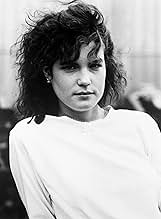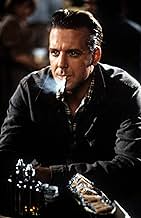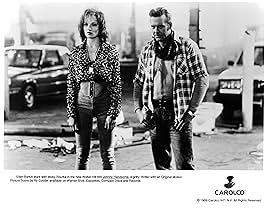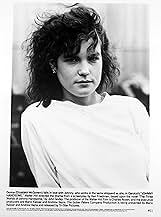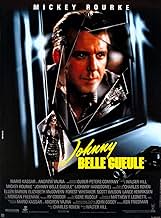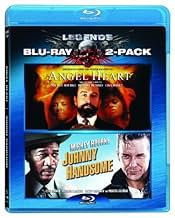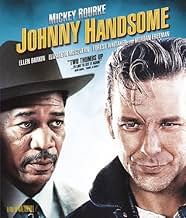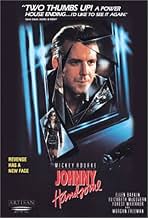AVALIAÇÃO DA IMDb
6,1/10
12 mil
SUA AVALIAÇÃO
Depois de ser traído e jogado na cadeia, um gângster deformado ganha um novo rosto e é reabilitado, mas seu desejo de vingança continua.Depois de ser traído e jogado na cadeia, um gângster deformado ganha um novo rosto e é reabilitado, mas seu desejo de vingança continua.Depois de ser traído e jogado na cadeia, um gângster deformado ganha um novo rosto e é reabilitado, mas seu desejo de vingança continua.
- Direção
- Roteiristas
- Artistas
- Prêmios
- 4 indicações no total
Jeffrey Meek
- Earl
- (as Jeff Meek)
John P. Fertitta
- Prestige Salesman
- (as John Fertitta)
Edward Walsh
- Judge
- (as Ed Walsh)
- Direção
- Roteiristas
- Elenco e equipe completos
- Produção, bilheteria e muito mais no IMDbPro
Avaliações em destaque
Well renowned action director Walter Hill tackles a more moody, character driven crime drama in the shape of "Johnny Handsome" and it would have to be one of his under-the-radar productions. The story follows that of a deformed criminal John who stages a heist, however there's a double-cross which sees his best friend killed and him going to prison. There he is asked to take part in a rehabilitation program, where they clear him of his deformity while also getting him parole. Hoping now that he can start a new life, however John is still burning inside for vengeance.
Presenting an ideal cast, Hill really does cast a spell over his audience with solid (even if it does feel a bit underdone) story-telling backed up by credibly good performances from leading man Mickey Rourke (within the peak of his career) and equally so support by Morgan Freeman, Ellen Barkin Lance Henrikson, Elizabeth McGovern and Forest Whitaker. Everybody chips in, adding their own stamp to proceedings and establishing gripping character rapports or confrontations (e.g. between Freeman's detective and Whitaker's doctor).
Hill's cruise-like direction is crisp and tidy, engineering some intense passages and some well-oiled, edgy action set-pieces, although they are low-key (still violent) but this really does belong to its cast and the interestingly, smart story (that was adapted off John Godey's novel "The Three Worlds of Johnny Handsome"). The ambitious plot does have a lot going on and it might not all come together, but how it does play out stays constantly interesting and rather unpleasant in its details. Rourke's character Johnny is given a chance to start over and go straight, from this physical change brings much needed confidence but the hunger inside for revenge can't simply be cured or forgotten. Someone he cared for, who saw beyond his deformity deserved payback. Johnny would deliver it. So he carefully plans out the revenge, wanting to tease before actually ending it and things get even more suspenseful when the situation starts to go off the rails. Lance Henrikson and Ellen Barkin really do nail down their explosively sly parts of the two crooks who betrayed Johnny. The ever-reliable, Hill regular Ry Cooder adds a smoking touch to the music score.
One of those films I didn't know all that much of, but came away pleasantly surprised.
Presenting an ideal cast, Hill really does cast a spell over his audience with solid (even if it does feel a bit underdone) story-telling backed up by credibly good performances from leading man Mickey Rourke (within the peak of his career) and equally so support by Morgan Freeman, Ellen Barkin Lance Henrikson, Elizabeth McGovern and Forest Whitaker. Everybody chips in, adding their own stamp to proceedings and establishing gripping character rapports or confrontations (e.g. between Freeman's detective and Whitaker's doctor).
Hill's cruise-like direction is crisp and tidy, engineering some intense passages and some well-oiled, edgy action set-pieces, although they are low-key (still violent) but this really does belong to its cast and the interestingly, smart story (that was adapted off John Godey's novel "The Three Worlds of Johnny Handsome"). The ambitious plot does have a lot going on and it might not all come together, but how it does play out stays constantly interesting and rather unpleasant in its details. Rourke's character Johnny is given a chance to start over and go straight, from this physical change brings much needed confidence but the hunger inside for revenge can't simply be cured or forgotten. Someone he cared for, who saw beyond his deformity deserved payback. Johnny would deliver it. So he carefully plans out the revenge, wanting to tease before actually ending it and things get even more suspenseful when the situation starts to go off the rails. Lance Henrikson and Ellen Barkin really do nail down their explosively sly parts of the two crooks who betrayed Johnny. The ever-reliable, Hill regular Ry Cooder adds a smoking touch to the music score.
One of those films I didn't know all that much of, but came away pleasantly surprised.
This is an engrosssing,pulse pounding thriller. It has depth not often found in many Hollywood movies in its characters. Even though it was made in 1989, this is classic Film-Noir. It has that dark, edgy, disturbing feel that is typically found only in Detective Movies of the 30s and 40s. It reaches down into the dark recesses of the soul and displays them for the audience. The way it plays out is much more in the style of Old Movies. It displays the powerful extremes that come in the nature of Good and Evil. This movie isn't just a simple thrill-ride of a movie, it is powerful, gripping entertainment.
This is a minor Walter Hill film, partly redeemed by a couple of strong performances and an excellent score. Mickey Rourke (whose last good film perhaps this is) plays John Sedley /Johnny Handsome' and labours for the first part of the film under make up presumably inspired by the Elephant Man - as well as a handicapping mumble, recalling the actor's idol Marlon Brando. Hill, one time Peckinpah protégé, has seen better days with such films as The Warriors, 48 Hours, Streets of Fire etc, and here struggles to make a rather bald plot dynamic. Essentially it's a tale of crime gone wrong, betrayal, brooding and then final revenge, enlivened with rather peremptory love interest. The surgery side of the story, in which Sedley is miraculously remade into handsome Mickey Rourke, is no more than a detour from an underworld tale we've all seen before.
Hill characteristically provides memorable opening sequences for his films. This strength is apparent here, as details of the cast appear over the preparation for the initial robbery, cut together effectively and precisely. The director fades the colour on these opening planning scenes, and later also includes a brief and horrific flashback in black and white. There are two robberies in the film, central points about which much of the drama revolves, carried off with some flair by the participants and the editing department. There's something of the flair of Hong Kong crime cinema as the masked villains burst into shops and offices to make their killing'. Elsewhere things flag a little - especially in the unconvincing Sunny Rafe relationship, played respectively by an aggressive Ellen Barkin and the normally excellent Lance Henriksen. Sadly the character and motivations of the chief villain remains one-dimensional, and Rafe's bare-armed menace never rises above stereotype.
Sedley struggles to first rebuild his face, then his life, while courting the rather insipid Donna (Elizabeth McGovern) and hatching his master plan. Although his motivation for revenge is clear, in between surgery and larceny he rather languishes. Donna is a `nice girl': either naïve or forgiving, however one choses to see her, whose role in the final denouement is also deemed `nice work'. This vaguely pejorative epithet, as well as her ill-judged covering up for a former boyfriend, provide her character's most defining moments. Her presence fails to give Sedley the impetus he needs, and her final abduction is sadly predictable. The attempt to work up another major character, this time through the doctor-with-a-social-conscience who treats Sedley (a peculiarly be-whiskered Forest Whitaker) is only partially successful. After a brief couple of confrontations with the implacable, and splendidly named, police Lieutenant A. Z. Drones (Morgan Freeman), he disappears. On the plus side, Rourke gives a generally good performance, being especially affecting in the scene when he examines his new face. Despite the limitations of the script, and even with the affected mumble, the actor avoids dropping into bathos in this critical scene, actually convincing the viewer of his pleasure in his new identity. His convincing gratitude to those who have changed his appearance pays dividends at the end of the film, during his confrontation with the vengeful Rafe. Rafe's pummeling of Sedley's face and vicious attack on his newly-constituted features with a knife is truly disturbing, precisely because Rourke has so successfully communicated the humanity behind the criminal and surgical subject earlier.
As Drones (whose dogged perseverance reminds one of Inspector Javert in Les Miserables), Freeman is excellent. An actor whose distinctive tones and modulated performances give class to any film, he raises his part far above the lines he is given here, and goes a way in making up for weaknesses elsewhere. During his few prison scenes with Rourke, in fact, one can shut one's eyes listen to his voice, and summon up the much greater pleasures of The Shawshank Redemption (1994). It is he who recognises the reality at the centre of the film: that Sedley can change his appearance, but can never change what is inside of himself or where it will lead: ` I know what you are' he says to the felon at one point. `And we both know where you're going, don't we Johnny?' At the close of the film, after bullets have flown and dust settled, Sedly finally acknowledges this fact using an ironic phrase which implies both physical and moral assessment : `How do I look?'.
Fans of Rourke and Freeman will certainly want to see this film, although others will find there is rather less to it than meets the eye. Ry Cooder, a regular collaborator with the director, turns in a superb score full of slide guitar work, with dramatic bass lines for the action sequences. This makes one regret that the final package to which he contributed so valiantly is ultimately so unmemorable. Admirers of Hill, wanting to see one of his late urban thrillers with more interest, will be better off with Trespass of three years later.
Hill characteristically provides memorable opening sequences for his films. This strength is apparent here, as details of the cast appear over the preparation for the initial robbery, cut together effectively and precisely. The director fades the colour on these opening planning scenes, and later also includes a brief and horrific flashback in black and white. There are two robberies in the film, central points about which much of the drama revolves, carried off with some flair by the participants and the editing department. There's something of the flair of Hong Kong crime cinema as the masked villains burst into shops and offices to make their killing'. Elsewhere things flag a little - especially in the unconvincing Sunny Rafe relationship, played respectively by an aggressive Ellen Barkin and the normally excellent Lance Henriksen. Sadly the character and motivations of the chief villain remains one-dimensional, and Rafe's bare-armed menace never rises above stereotype.
Sedley struggles to first rebuild his face, then his life, while courting the rather insipid Donna (Elizabeth McGovern) and hatching his master plan. Although his motivation for revenge is clear, in between surgery and larceny he rather languishes. Donna is a `nice girl': either naïve or forgiving, however one choses to see her, whose role in the final denouement is also deemed `nice work'. This vaguely pejorative epithet, as well as her ill-judged covering up for a former boyfriend, provide her character's most defining moments. Her presence fails to give Sedley the impetus he needs, and her final abduction is sadly predictable. The attempt to work up another major character, this time through the doctor-with-a-social-conscience who treats Sedley (a peculiarly be-whiskered Forest Whitaker) is only partially successful. After a brief couple of confrontations with the implacable, and splendidly named, police Lieutenant A. Z. Drones (Morgan Freeman), he disappears. On the plus side, Rourke gives a generally good performance, being especially affecting in the scene when he examines his new face. Despite the limitations of the script, and even with the affected mumble, the actor avoids dropping into bathos in this critical scene, actually convincing the viewer of his pleasure in his new identity. His convincing gratitude to those who have changed his appearance pays dividends at the end of the film, during his confrontation with the vengeful Rafe. Rafe's pummeling of Sedley's face and vicious attack on his newly-constituted features with a knife is truly disturbing, precisely because Rourke has so successfully communicated the humanity behind the criminal and surgical subject earlier.
As Drones (whose dogged perseverance reminds one of Inspector Javert in Les Miserables), Freeman is excellent. An actor whose distinctive tones and modulated performances give class to any film, he raises his part far above the lines he is given here, and goes a way in making up for weaknesses elsewhere. During his few prison scenes with Rourke, in fact, one can shut one's eyes listen to his voice, and summon up the much greater pleasures of The Shawshank Redemption (1994). It is he who recognises the reality at the centre of the film: that Sedley can change his appearance, but can never change what is inside of himself or where it will lead: ` I know what you are' he says to the felon at one point. `And we both know where you're going, don't we Johnny?' At the close of the film, after bullets have flown and dust settled, Sedly finally acknowledges this fact using an ironic phrase which implies both physical and moral assessment : `How do I look?'.
Fans of Rourke and Freeman will certainly want to see this film, although others will find there is rather less to it than meets the eye. Ry Cooder, a regular collaborator with the director, turns in a superb score full of slide guitar work, with dramatic bass lines for the action sequences. This makes one regret that the final package to which he contributed so valiantly is ultimately so unmemorable. Admirers of Hill, wanting to see one of his late urban thrillers with more interest, will be better off with Trespass of three years later.
"Johnny Handsome" is a flawed but fascinating work from Walter Hill. Mickey Rourke is great as a deformed criminal who returns to avenge the people (Ellen Barkin and Lance Henriksen) who wronged him. The conceit of the premise is that Johnny's enemies will not see him coming with his new face, a face rebuilt after his ugly one was cut to pieces. Unfortunately, this potentially rich premise is quickly discarded and the film becomes a more standard crime yarn with a pointless love story thrown in. Johnny's love interest, Elizabeth McGovern, who was great in a similar role in "Racing With The Moon", is wasted and just doesn't belong in this material.
Lance Henriksen and Ellen Barkin are great as two of the oiliest lowlifes to impact with a movie screen in years. Barkin's pronunciation of the word "geek", when referring to Rourke's character, is hilarious, as is the crime couple's incessant badgering of each other. If the film had focused more on this duo and less on McGovern and another subplot involving Forest Whitaker, who is saddled with a dreadfully written role as a doctor who tries to help Johnny, it would have been a true contender.
The opening robbery scene is classic Hill -- brutal and economical -- and sets high expectations for the mayhem to come. Ry Cooder's slide guitar score is mesmerizing, and Mathew F. Leonetti's cinematography is moody and beguiling.
Ultimately, the film is a gritty pulp crime novel compromised by studio concessions. Which is such a crying shame.
Lance Henriksen and Ellen Barkin are great as two of the oiliest lowlifes to impact with a movie screen in years. Barkin's pronunciation of the word "geek", when referring to Rourke's character, is hilarious, as is the crime couple's incessant badgering of each other. If the film had focused more on this duo and less on McGovern and another subplot involving Forest Whitaker, who is saddled with a dreadfully written role as a doctor who tries to help Johnny, it would have been a true contender.
The opening robbery scene is classic Hill -- brutal and economical -- and sets high expectations for the mayhem to come. Ry Cooder's slide guitar score is mesmerizing, and Mathew F. Leonetti's cinematography is moody and beguiling.
Ultimately, the film is a gritty pulp crime novel compromised by studio concessions. Which is such a crying shame.
I really like this movie. Ellen Barkin's performance as a foul mouthed moll to Lance Henrickson's depraved killer club owner is striking. Even Mickey Rourke gives a true interpretation of the title character. Check out the scene where Johnny sees his completed new face for the first time, he captures the scene perfectly.
Você sabia?
- CuriosidadesAl Pacino was initially interested in playing the title character, and worked with the producers on developing the script, but ultimately dropped out of the project, due to script problems. Pacino felt, despite numerous revisions, they had never been able to transcend the script's B-movie qualities.
- Erros de gravaçãoDuring the graveyard scene, Larry "pumps" the action on a double barreled shotgun.
- Citações
Vic Dumask: I don't know you, Mr. Mitchell. What can I do for you?
John 'Johnny Handsome' Sedley: A laundry service. Could be five million dollars worth.
Vic Dumask: That sounds illegal.
John 'Johnny Handsome' Sedley: [sotto voce] It is.
Principais escolhas
Faça login para avaliar e ver a lista de recomendações personalizadas
- How long is Johnny Handsome?Fornecido pela Alexa
Detalhes
- Data de lançamento
- País de origem
- Idioma
- Também conhecido como
- Johnny Handsome
- Locações de filme
- Empresas de produção
- Consulte mais créditos da empresa na IMDbPro
Bilheteria
- Orçamento
- US$ 20.000.000 (estimativa)
- Faturamento bruto nos EUA e Canadá
- US$ 7.237.794
- Fim de semana de estreia nos EUA e Canadá
- US$ 2.437.642
- 1 de out. de 1989
- Faturamento bruto mundial
- US$ 7.237.794
- Tempo de duração1 hora 34 minutos
- Cor
- Mixagem de som
- Proporção
- 1.85 : 1
Contribua para esta página
Sugerir uma alteração ou adicionar conteúdo ausente

Principal brecha
By what name was Um Rosto Sem Passado (1989) officially released in India in English?
Responda


